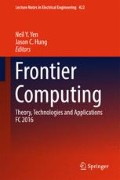Abstract
As indicated by some studies, the problem of prior knowledge often exists when exploring the outcome of reading comprehension in academic language learning. This pilot study aimed to employ eye tracking technology to explore how students with different levels of prior knowledge processed the content of manga-based interactive E-book while learning Japanese language. Students’ visual behaviors were tracked and recorded when they read a Japanese conversation with the relationship between graphical manga and interactive textual annotations. According to the pretest scores, 6 university students were categorized into high and low prior knowledge (PK) groups. Using EyeNTNU-120 eye tracker to compare including Total Contact Time (TCT), Number of Fixations (NOF), and Number of Clicks on textual annotations of the two PK groups based on areas of interests (AOIs) was measured. After the eye tracking experiment, students received a posttest of reading comprehension . The results revealed that (1) the high PK students showed longer reading time in graphic AOIs than the low PK students, (2) the low PK students showed longer reading time in text AOIs than the high PK students, (3) the low PK students showed longer reading time in annotation AOIs than the high PK students, (4) the high and low PK students had no significant difference in the whole reading time, (5) the low PK students showed more NOF of texts that the high PK students, (6) the low PK students clicked many of annotations AOIs than the high PK students, and (7) the low PK students had a significant outcome of reading comprehension compared with pretest and posttest scores. This suggests that interactive E-book containing graphical manga attracted students’ visual attention and improved students’ outcome of reading comprehension. Suggestions are made for future studies and instructional design for interactive E-book learning.
Access this chapter
Tax calculation will be finalised at checkout
Purchases are for personal use only
References
Adams, J.: A Critical Study of Comics. Jade 20.2, NSEAD, p.p. 133–143 (2001)
Black, R.W.: Access and Affiliation: The Literacy and Composition Practices of English-language Learners in an On-line Fanfiction Community. Journal of Adolescent & Adult Literacy. 49, 2, 118–128 (2005)
Bryce, M., Davis, J. & Barber, C.: The Cultural Biographies and Social Lives of Manga: Lessons from the Mangaverse. Retrieved from http://scan.net.au/scan/journal/display.php?journal_id=114
Calvo, M.G., Lang, P.J.: Gaze Patterns When Looking at Emotional Pictures: Motivationally Biased Attention. Motivation and Emotion, 28, 3, 221–243 (2004)
Cary, S.: Going graphic: Comics at work in the multilingual classroom. Portsmouth, NH: Heinemann (2004)
Chou, I.C.: Investigating EFL Students’ E-book Reading Attitudes in First and Second Language. US-China Foreign Language, 12, 1, 64–74 (January 2014)
Cohen, J.: Statistical Power Analysis for the Behavioral Sciences (2nd ed.). New Jersey: Lawrence Erlbaum Associates (1988)
Hewig, J., Trippe, R.H., Hecht, H., Straube, T., Miltner, W.H.R.: Gender differences for specific body regions when looking at men and women. Journal of Nonverbal Behavior, 32, 2, 67–78 (2008)
Khurana, S.: So You Want to Be a Superhero? How the Art of Making Comics in an Afterschool Setting Can Develop Young People’s Creativity, Literacy and Identity. Afterschool Matters. 4, 1–9 (2005)
Korat, O., Shamir, A.: Do Hebrew Electronic Books Differs from Dutch Electronic Books? A Replication of a Dutch Content Analysis. Journal of Computer Assisted Learning. 20, 4, 257–268 (2004)
Lin, I.Y.: The Effect of E-books on EFL Learners’ Reading Attitude, (National Taiwan Normal University, Taiwan). Retrieved from http://ndltd.ncl.edu.tw/cgi-bin/gs32/gsweb.cgi?o=dnclcde&s=id=%22097NTNU5238009%22.&searchmode=basic
Mayer, R.E.: Multimedia Learning (2nd ed.). New York: Cambridge University Press (2001)
Moist, K.M., Bartholomew, M.: When Pigs Fly: Anime, Auteurism, and Miyazaki’s Porco Rosso, London, Los Angeles, New Delhi & Singapore: SAGE Publications (2007)
Ogawa, E.: Educational Manga: An Effective Medium for English Learning. In N. Sonda & A. Krause (Eds.), JALT2012 Conference Proceedings. Tokyo: JALT (2003)
Paivio, A.: Mental Representations: A Dual Coding Approach. Oxford. England: Oxford University Press (1986)
Rayner, K.: Eye Movements in Reading and Information Processing: 20 Years of Research. Psychological Bulletin. 124, 3, 372–422 (1998)
Riley, P.: “Drawing the Threads Together,” In D. Little, J. Ridley, & E. Ushioda (Eds.), Learner Autonomy in the Foreign Language Classroom: Teacher, Learner, Curriculum and Assessement. Dublin: Authentik, p.p. 237–252 (2003)
Shimada, A., Okubo, F., Yin, C.J., Oi, M., Kojima, K., Yamada, M., Ogata, H.: Analysis of Preview Behavior in E-book System. In Ogata, H. et al. (Eds.): the 23rd International Conference on Computers in Education (ICCE 2015), p.p. 593–600. Hangzhou, China, Nov. 30–Dec. 4 (2015)
Smith, S.D., Caruso, J.B.: The ECAR Study of Undergraduate Students and Information Technology, (Research study, vol. 6). Boulder, CO: EDUCAUSE Center for Applied Research. Retrieved from http://www.educause.edu/ers1006
Wolfe, P.: Brain Matters: Translating Research into Classroom Practice (2nd ed.) A, VA: Association for Supervision & Curriculum Development (2010)
Yin C.J., Okubo, F., Shimada, A., Oi, M., Hirokawa, S., Ogata, H.: Identifying and Analyzing the Learning Behaviors of Students using e-Books. In Ogata, H. et al. (Eds.): the 23rd International Conference on Computers in Education (ICCE 2015), p.p. 118–120. Hangzhou, China, Nov.30–Dec. 4 (2015)
Acknowledgements
Funding of this research work was supported by Ministry of Science and Technology (MOST), Taiwan, under Grant number: MOST 104-2511-S-149-001. The authors also wish to thank the Aim for the Top University (ATU) project of National Taiwan Normal University (NTNU) on eye-tracking technology.
Author information
Authors and Affiliations
Corresponding author
Editor information
Editors and Affiliations
Rights and permissions
Copyright information
© 2018 Springer Nature Singapore Pte Ltd.
About this paper
Cite this paper
Wang, CC., Ho, HF., Chen, GA., Su, HS. (2018). Eye Tracking as a Tool in Manga-Based Interactive E-book on Reading Comprehension in Japanese Learning. In: Yen, N., Hung, J. (eds) Frontier Computing. FC 2016. Lecture Notes in Electrical Engineering, vol 422. Springer, Singapore. https://doi.org/10.1007/978-981-10-3187-8_17
Download citation
DOI: https://doi.org/10.1007/978-981-10-3187-8_17
Published:
Publisher Name: Springer, Singapore
Print ISBN: 978-981-10-3186-1
Online ISBN: 978-981-10-3187-8
eBook Packages: EngineeringEngineering (R0)

